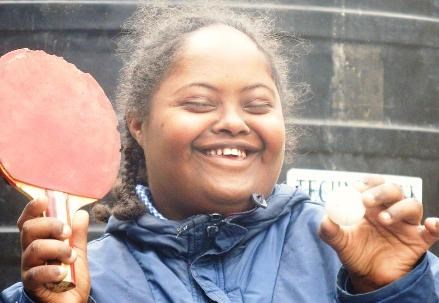 |
In many countries, particularly in the developing world, people with disabilities are seen as second-class citizens, at best.
In these places, not only are the disabled denied participation in most able-bodied activities, but they are actually shunned in many cases, abused and either neglected, or totally abandoned. Though they suffer from the physical plight of their disability, perhaps equally painful is the lack of compassion and care shown to them.
Considered the planet’s largest minority, there are approximately 650 million disabled people in the world, 80% of whom – that is, 520 million – live in the developing world.
Yet perhaps due to the economic disparity in these nations, or lack of greater resources, or skewed traditional views, the misunderstanding, and consequently, the mistreatment of this vast minority is rampant.
Yet of course, the developed world does not go blameless either, as often, even despite access to resources, the disabled often face societal and physical hurdles there as well.
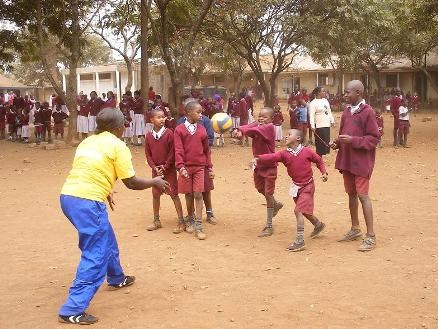 |
The United Nations is well aware of the problems facing the disabled, and from 2002 to 2006 it held a series of monumental meetings that created a declaration of rights for the disabled.
First, the convention defined the disabled as: “…those who have long-term physical, mental, intellectual or sensory impairments which in interaction with various barriers may hinder their full and effective participation in society on an equal basis with others.”
Subsequently, the convention focused on eight guiding principles – namely: non-discrimination, accessibility, full participation in society, respect and acceptance of human diversity, equality of opportunity, equality amongst genders, and respect for children with disabilities, and an overall respect for the “inherent dignity, individual autonomy including the freedom to make one's own choices, and independence of persons.”
In response to this monumental convention, APAID was created to improve the quality of life for the disabled in developing countries by two French young persons-- Pierre Bataille, and Steffi de Jonq, both in their 20s.
Said Pierre: "Since my early childhood, I have the passion for sports. After I discovered the existence of adapted sport, I became a big admirer of sport for people with disabilities and decided to make it my area of work."
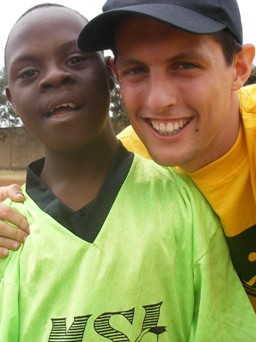
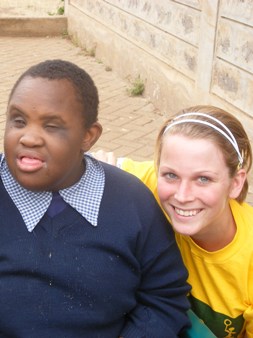
The simple act of participating in sporting activities or other similar physical experiences can have a life-altering impact on the disabled, creating increased self-confidence and self-esteem, and subsequently, EMPOWERMENT.
Hand in hand with that, physical activity also offers an increase in peer interaction and social relationships, which as a whole, create a far greater quality of life both for the disabled, and for their families.
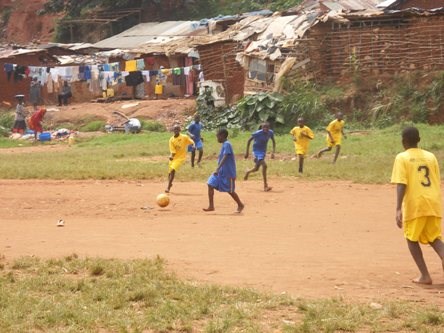 |
Since May 2008, in Kenya, APAID helps MYSA, its local partner organization, implement physical activity programs for the disabled.
Through APAID, weekly recreational days which include 7 different adaptive sports, are created for children with disabilities at a centralized local venue.
Volunteers, many of whom are disabled themselves, are provided with courses and training, both on the topic of disabilities, and on the physical activities they will be assisting with.
To spread the word about the programs, outreach is conducted in the poverty-stricken ‘slum’ areas of Nairobi, Kenya. The outreach is so effective that already over 200 children benefit from participating in the physical activities each month!
Awareness campaigns also take place throughout the community, to help others understand, and subsequently become more compassionate towards and more accepting of, those with disabilities. Each month over 300 community members participate in these campaigns, a statistic which organizers hope will slowly shift the current societal paradigms about the disabled.
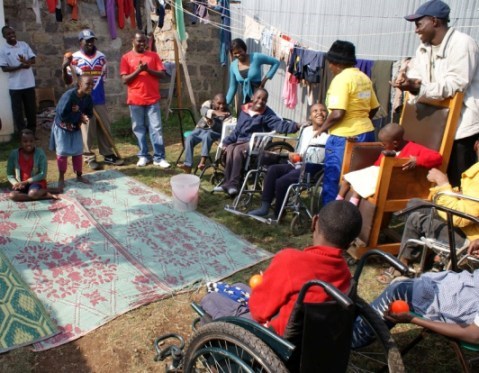 |
In Kampala, Uganda, APAID works with ‘The Kids League,’ a local partner organization to implement physical programs for the disabled.
Starting in February 2009, the Ugandan project estimates that it will benefit at least 150 disabled children, some of whom are former child soldiers, as well as its volunteers (who again, in many cases, are disabled themselves), which, as in Kenya, are offered courses and training.
Additionally, through outreach, APAID is confident that they will reach a large percentage of the community and instill greater awareness of and understanding towards the disabled.
There, three 7-week leagues, which include one training session and one match each week, will be implemented for disabled children ages 6-14.
Ever focused on research, APAID works in collaboration with premier universities worldwide, to evaluate and monitor the effectiveness and impact of their project.
In Uganda, APAID is working with Stanford University in the United States, and in Kenya, with the University of Paris X in France, and with Jomo Kenyatta University in Kenya.
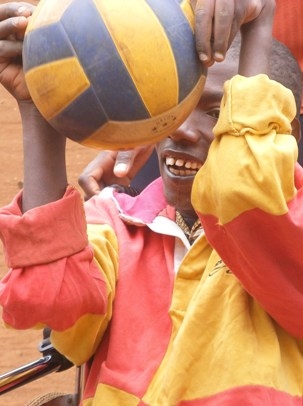 |
Although a relatively new project, thanks to well thought out partnerships and a fervent desire to help disabled children in the developing world, APAID is sure to continue to make great strides. There are of course, challenges that have been faced and overcome, and other hurdles that will present themselves in the future. Says co-founder, Steffi: "I think my biggest challenge in setting up projects is to adapt my expectations in such a way that they are realistic in the context and culture I am working in. . Working in Africa is absolutely not the same as working in Europe. Sometimes I would like to be more efficient, but that can be impossible."
But just as the disabled work hard to thrive despite their limitations, so must the project, and with that, often come blessings in disguise.
She continues: " I can say that this challenge is also one of the reasons why I like the work so much. I never know what is going to happen that day....the first recreation day in Kenya, where I could see the results of all the efforts, was very special to me."
Already in one year, APAID has touched the lives of hundreds of children and community members in Kenya, and in 2009 it will begin to do so in Uganda as well.
Only time will tell the ultimate breadth of the program, but for those children and their families whose lives have already been enriched by these programs, the volunteers, founders, and staff of APAID are already heroes in their world.
Page created on 1/29/2009 1:02:14 PM
Last edited 1/29/2009 1:02:14 PM
